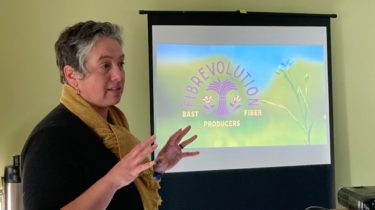
The environmental impact of textile production, especially ‘fast fashion’, is well documented. The textile industry is one of the top three most polluting industrial sectors in the world. As well as being associated with unhealthy labour conditions, modern textile production also relies heavily on monocultural farming; this results in soil depletion and a loss of biodiversity. The harm is amplified by the industry’s widespread use of pesticides and synthetic dyes. Long-haul supply and distribution chains add to allied damage.
You may have heard the term ‘regenerative textiles’. We use the term here to emphasise that there are methods of textile production which have the potential to enhance the planet, rather than continuing to extract and exploit. By keeping production local, growing natural fibre and dye sources, and employing ecologically-sensitive farming and production methods, textiles can go “soil to shelf” enhancing soil health in the process.
Regenerative Networks in Scotland
Scotland is up for the challenge. We already prioritise both well-being and circular economies. Creating regenerative textiles is part of a growing culture shift that has its roots in our heritage and our contemporary concern for the most pressing issues of our time: soil health, biodiversity and climate change.
Journeys in Design began to collate ideas and links across Scotland coincident with our first Flax and Linen Festival in September 2021 and then organised two further meetings on the ground.
- In September 2021, we welcomed Shannon Welsch and Angela Wartes-Kahl, founders of Fibrevolution and Pacific North West Fibreshed to our Think Global Grow Local Roundtable and then to our in-person first meeting
- In October 2021, we convened a meeting in Kinghorn Fife, to discuss the potential for a Regenerative Textiles Network in Scotland, modelled on the US Fibreshed network, attended by a core group also pursuing this possibility
- In March 2022, we brought the group together again in St Monans Fife, supplemented by others with interest and new insights, delighted to be at Bowhouse, centre of a regenerative farming and food initiative, many parallels with fibre are clear; our ‘show and tell’ of existing regenerative textile initiatives in flax, linen, wool, nettle, hemp and leather provided useful focus
Special thanks to those from Scotland and beyond who offered focus presentations
- Angela Wartes-Kahl: of ‘Fibrevolution‘ and co-founder of Fibreshed Pacific North West
- Rosie Bristow: MSc Heriot Watt researching mechanised flax processing equipment
- Prof Jane McCann: textiles innovator and design lead for Invest N.Ireland Fibre Development
- Justine Aldersey-Williams of Home Grown Home Spun and founder Fibreshed North West England
- Chantel Davies of Soil Association Scotland
Regenerative Textile Scotland Symposium
Journeys in Design continues to support moves towards a regenerative textile economy in Scotland. To this end we are collaborating to host a Regenerative Textile Scotland Symposium summer 2023 in Edinburgh. Please sign up to our Newsletter and follow us on Instagram and Facebook for updates; email us on info@journeysindesign.com
A Fibreshed for Scotland: local fibres, local dyes, local labour
Fibreshed is an international network born in California USA. It exists to encourage the development of an ecological approach to textiles; the tagline is ‘local fibers, local dyes, local labor‘. The following explanation is from Fibreshed south west England
“Much like a watershed, a Fibreshed is a designated area within which efforts are made to harness and use natural resources – in this case fibres, dyes and labour – in a responsible way that minimises waste and creates opportunities not just for sustaining these resources, but for improving them over time in positive feedback cycles.
In other words, the Fibreshed ethos goes beyond sustainability, to something that is truly regenerative and it does this by considering the whole system in which fibres, textiles and garments are not only produced, but also how they are worn and how they are disposed of.”
Following our meetings a small admin team secured Affiliation for a Fibreshed Scotland. Work is on-going, Website, Instagram and Mapping exercise, and the team are keen to hear more from individuals and groups who might join or support. Signal your interest with an email to fibreshedscotland@gmail.com

